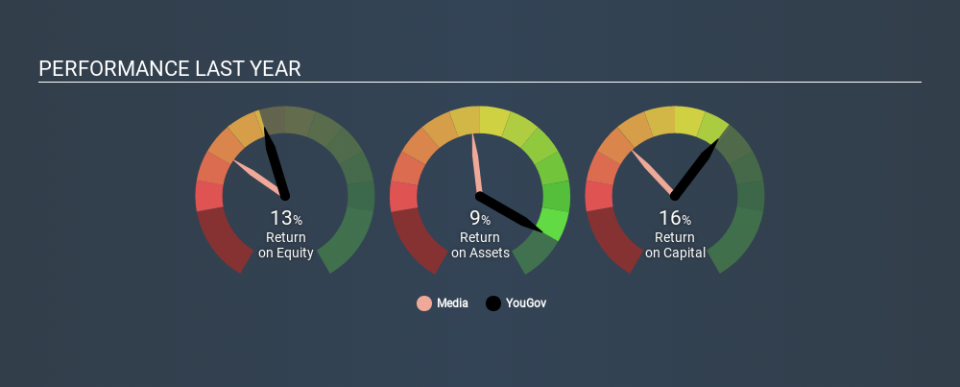Is YouGov plc’s (LON:YOU) 16% ROCE Any Good?

Today we'll evaluate YouGov plc (LON:YOU) to determine whether it could have potential as an investment idea. Specifically, we're going to calculate its Return On Capital Employed (ROCE), in the hopes of getting some insight into the business.
Firstly, we'll go over how we calculate ROCE. Second, we'll look at its ROCE compared to similar companies. Finally, we'll look at how its current liabilities affect its ROCE.
Understanding Return On Capital Employed (ROCE)
ROCE is a metric for evaluating how much pre-tax income (in percentage terms) a company earns on the capital invested in its business. In general, businesses with a higher ROCE are usually better quality. In brief, it is a useful tool, but it is not without drawbacks. Renowned investment researcher Michael Mauboussin has suggested that a high ROCE can indicate that 'one dollar invested in the company generates value of more than one dollar'.
How Do You Calculate Return On Capital Employed?
Analysts use this formula to calculate return on capital employed:
Return on Capital Employed = Earnings Before Interest and Tax (EBIT) ÷ (Total Assets - Current Liabilities)
Or for YouGov:
0.16 = UK£20m ÷ (UK£171m - UK£49m) (Based on the trailing twelve months to July 2019.)
Therefore, YouGov has an ROCE of 16%.
View our latest analysis for YouGov
Is YouGov's ROCE Good?
When making comparisons between similar businesses, investors may find ROCE useful. Using our data, we find that YouGov's ROCE is meaningfully better than the 7.8% average in the Media industry. I think that's good to see, since it implies the company is better than other companies at making the most of its capital. Separate from YouGov's performance relative to its industry, its ROCE in absolute terms looks satisfactory, and it may be worth researching in more depth.
In our analysis, YouGov's ROCE appears to be 16%, compared to 3 years ago, when its ROCE was 6.8%. This makes us think about whether the company has been reinvesting shrewdly. You can see in the image below how YouGov's ROCE compares to its industry. Click to see more on past growth.
It is important to remember that ROCE shows past performance, and is not necessarily predictive. ROCE can be deceptive for cyclical businesses, as returns can look incredible in boom times, and terribly low in downturns. This is because ROCE only looks at one year, instead of considering returns across a whole cycle. Future performance is what matters, and you can see analyst predictions in our free report on analyst forecasts for the company.
What Are Current Liabilities, And How Do They Affect YouGov's ROCE?
Current liabilities include invoices, such as supplier payments, short-term debt, or a tax bill, that need to be paid within 12 months. The ROCE equation subtracts current liabilities from capital employed, so a company with a lot of current liabilities appears to have less capital employed, and a higher ROCE than otherwise. To check the impact of this, we calculate if a company has high current liabilities relative to its total assets.
YouGov has total assets of UK£171m and current liabilities of UK£49m. As a result, its current liabilities are equal to approximately 28% of its total assets. Low current liabilities are not boosting the ROCE too much.
The Bottom Line On YouGov's ROCE
With that in mind, YouGov's ROCE appears pretty good. There might be better investments than YouGov out there, but you will have to work hard to find them . These promising businesses with rapidly growing earnings might be right up your alley.
For those who like to find winning investments this free list of growing companies with recent insider purchasing, could be just the ticket.
If you spot an error that warrants correction, please contact the editor at editorial-team@simplywallst.com. This article by Simply Wall St is general in nature. It does not constitute a recommendation to buy or sell any stock, and does not take account of your objectives, or your financial situation. Simply Wall St has no position in the stocks mentioned.
We aim to bring you long-term focused research analysis driven by fundamental data. Note that our analysis may not factor in the latest price-sensitive company announcements or qualitative material. Thank you for reading.


